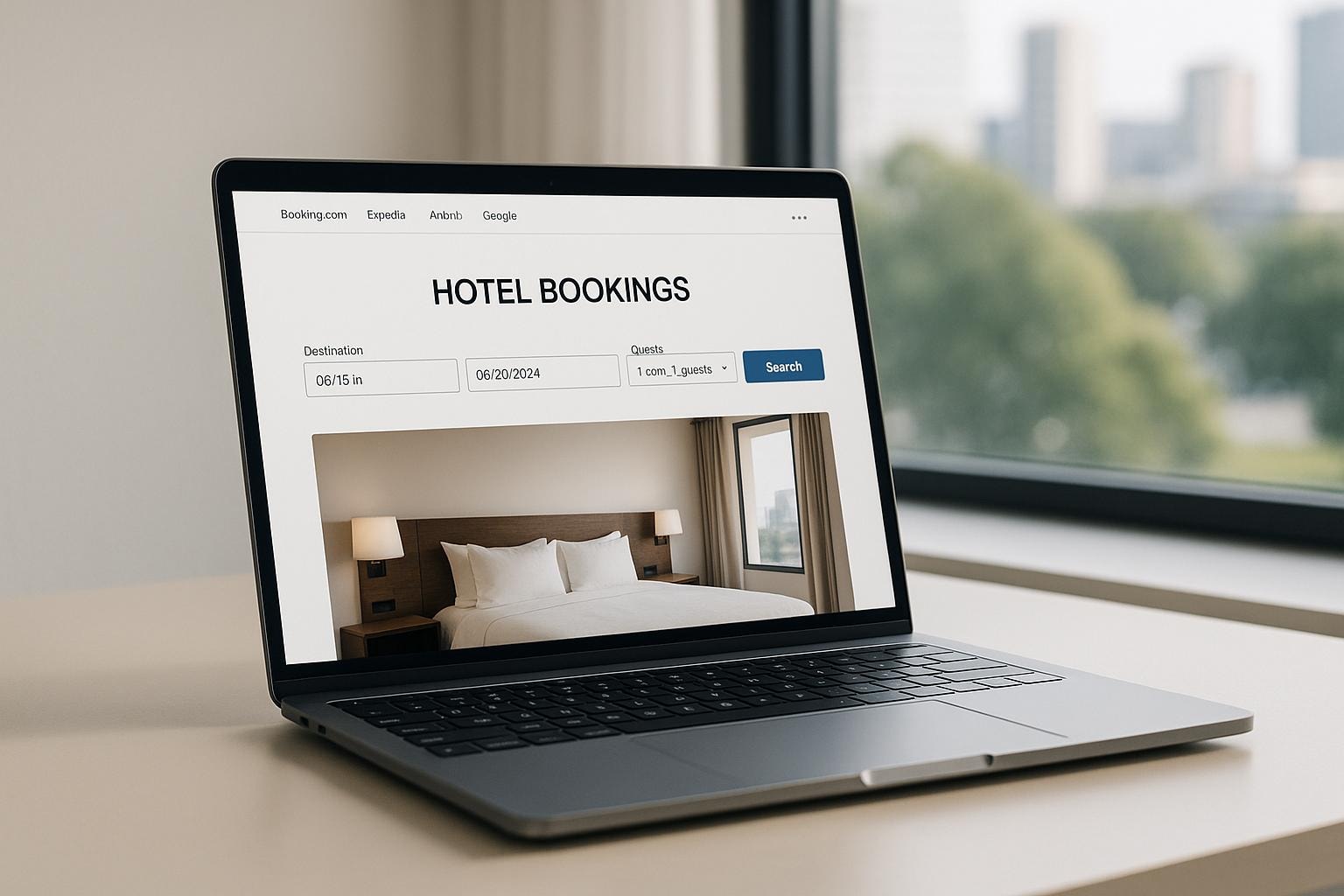
Best AI Tools for Multi-Channel Hotel Bookings
Cut staffing costs by 30% while boosting revenue 15% with AI that handles bookings, guest requests, and pricing across all channels automatically.

Written by
Adam Stewart
Key Points
- Save 30% on overnight staff - AI handles 85% of guest requests 24/7
- Boost occupancy 10% with AI pricing that adjusts based on demand
- Handle bookings in multiple languages without hiring multilingual staff
- Get 37% more efficient operations while never missing a reservation
Managing hotel bookings across multiple channels is challenging but crucial for hotels to stay competitive. AI tools simplify this process by automating tasks, reducing errors, and improving guest satisfaction. Key benefits include real-time inventory updates, dynamic pricing, and 24/7 customer support. Popular AI solutions like Dialzara, Safara, Triptease, and Whippy.ai focus on different aspects of booking management, from phone inquiries to direct website bookings and multi-channel communication. Here's a quick breakdown:
- Dialzara: AI-powered phone answering for round-the-clock booking and guest inquiries.
- Safara: Direct booking optimization through guest behavior analysis and real-time inventory sync.
- Triptease: Personalized messaging and price parity monitoring to boost direct bookings.
- Whippy.ai: Multi-channel communication handling (SMS, chat, phone, email).
Quick Comparison:
| Tool | Focus Area | Key Strengths |
|---|---|---|
| Dialzara | Phone bookings | 24/7 service, fast setup, cost efficiency |
| Safara | Direct website bookings | Guest intent analysis, real-time inventory |
| Triptease | Direct booking strategies | Price monitoring, personalized messaging |
| Whippy.ai | Multi-channel support | Unified communication, automation |
AI helps hotels save costs, improve efficiency, and provide better guest experiences. Choosing the right tool depends on your specific needs, like managing phone inquiries or boosting direct bookings.
Key Benefits of AI Solutions for Hotel Bookings
AI solutions are transforming hotel bookings by streamlining customer service, optimizing operations, and driving revenue growth. These technologies not only enhance guest experiences but also improve efficiency across all booking channels.
24/7 Availability and Enhanced Customer Support
One of the standout advantages of AI in hotel bookings is its ability to provide continuous, round-the-clock support. AI systems ensure immediate assistance at any time, eliminating downtime and improving customer experiences.
Take Marriott International, for example. By integrating AI into their customer service operations, the company reduced overnight staffing costs by 30% while increasing guest satisfaction during off-hours. Another success story is Velma, an AI virtual assistant capable of handling 85% of customer requests in 38 languages. This reduces the need for multilingual staff and ensures seamless communication regardless of the guest's language.
Guests are increasingly comfortable with AI. Research shows that 70% of travelers find chatbots helpful, and 58% believe AI enhances their overall hotel experience. Edwardian Hotels London demonstrates this with their AI chatbot "Edward", which assists guests with tasks like room service requests and local recommendations. By handling routine inquiries instantly, Edward allows human staff to focus on more personalized, complex guest needs, boosting both efficiency and satisfaction.
Automating Routine Tasks
AI thrives in automating repetitive tasks that typically consume valuable staff time. Beyond booking confirmations, AI solutions manage complex operations like scheduling, inventory management, and administrative workflows.
Hilton's Gabriel Miami South Beach provides a clear example of automation at work. In 2023, the hotel introduced mobile messaging to streamline guest communication. By mid-year, 63% of guests used the feature during their stay, with 100% of service issues resolved via direct messaging. This approach not only sped up response times but also allowed staff to handle requests more effectively.
Another example comes from a UK-based property rental company managing multiple apartments and hotels. After adopting AI tools, the company saw a 37% boost in operational efficiency, a 40% drop in administrative costs, and a 30% rise in booking rates. These results show how automation can enhance both internal processes and guest experiences.
The broader hotel industry echoes these successes, with 93% of hoteliers reporting major efficiency improvements after adopting technology.
Data Insights Driving Revenue Growth
AI takes raw booking data and converts it into actionable insights, enabling hotels to grow revenue and optimize occupancy. AI-driven revenue management systems have helped some hotels increase revenue by 10–15%, with occupancy rates climbing by 10%. For example, the Nobis Hotel in Stockholm achieved a 10% revenue boost using Atomize RMS, while The Grand Hôtel Stockholm saw a 15% revenue increase and a 25% reduction in time spent on revenue management tasks with the same system.
Dynamic pricing is another area where AI excels. By analyzing competitor rates, local events, and demand patterns in real time, AI systems adjust prices across booking channels to maximize revenue - without requiring manual intervention.
"AI uses historical data and machine learning models to forecast future demand. This ability to anticipate booking trends helps revenue managers optimize inventory and pricing strategies, ensuring they can adjust to market changes quickly." - Ryan Mummert, senior principal, insights and data portfolio leader at Capgemini
AI also enables better customer segmentation. By identifying profitable guest segments, hotels can create personalized offers that improve booking conversion rates. AI-powered marketing and pricing strategies have been shown to increase RevPAR by up to 15%. Additionally, intelligent building systems contribute by reducing energy costs by 10–25%.
Another valuable application is predictive maintenance. Using IoT sensors, AI monitors equipment performance and sends alerts 2–4 weeks before potential failures. This prevents costly repairs and avoids disruptions for guests.
From customer service to automation and data-driven decision-making, AI is reshaping hotel bookings. These advancements set the stage for exploring how AI-powered phone solutions, like Dialzara, can further enhance booking efficiency and guest satisfaction.
Dialzara: AI Virtual Phone Answering for Hotel Bookings
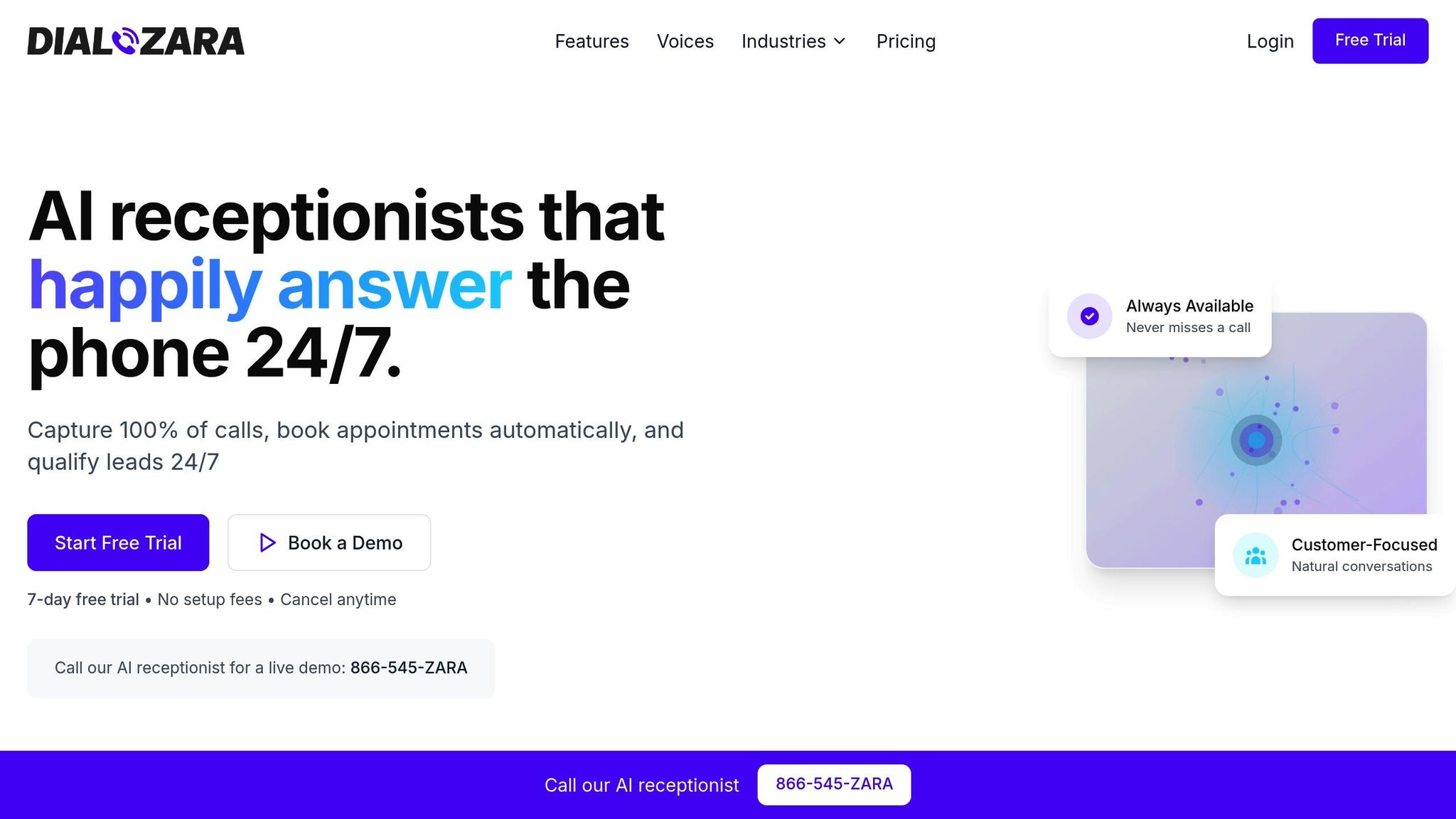
Handling phone calls is a critical part of managing hotel bookings, especially for last-minute reservations, group bookings, or more complex inquiries. Dialzara steps in as an AI-powered virtual phone answering service that operates 24/7, ensuring no booking opportunity slips through the cracks.
Dialzara Features Overview
Dialzara’s AI-driven voice system seamlessly integrates with over 5,000 applications, including hotel Property Management Systems (PMS), booking platforms, and CRM tools. This connectivity ensures smooth operations across all channels.
The platform handles a wide range of tasks, such as answering calls, transferring them, relaying messages, and even scheduling appointments. It’s built to understand industry-specific language and can adapt to the unique communication style of each hotel.
Getting started with Dialzara is quick and straightforward. Simply create an account, train the AI with a few questions, select a voice and phone number, and enable call forwarding. The AI continually learns from new interactions, guest feedback, and changing terminology, becoming more efficient and accurate over time.
How Hotels Use Dialzara
Managing high call volumes can be a challenge for hotels, especially during peak seasons or late-night hours. Dialzara steps in to provide consistent, prompt, and accurate responses, helping hotels stay on top of guest inquiries and bookings.
One of its standout features is after-hours booking management. With Dialzara, hotels can take reservations around the clock. The AI agent collects key details - like check-in dates and room preferences - and either processes simple bookings directly or routes more complex requests to the appropriate staff.
Beyond reservations, Dialzara is also a reliable tool for handling guest service inquiries. It can provide information about hotel amenities, local attractions, check-in procedures, and policies. For situations requiring human assistance, the system transfers calls seamlessly, giving staff all the necessary context to address the guest’s needs effectively. This streamlined approach not only improves service but also delivers measurable financial gains.
Benefits of Using Dialzara
Dialzara offers a range of advantages that can significantly impact a hotel’s bottom line. By automating phone support, hotels can reduce customer service costs by up to 90%, all while managing increased call volumes without sacrificing quality.
Its rapid deployment is another major benefit. Unlike the lengthy process of hiring and training staff, Dialzara can be up and running in minutes. This is particularly useful for seasonal properties or hotels experiencing sudden spikes in demand.
The platform also eliminates common staffing headaches, such as scheduling conflicts, sick days, or the need for ongoing training. It ensures consistent performance, regardless of external challenges.
Hotel managers can fine-tune Dialzara to handle a variety of scenarios, from straightforward inquiries to complex group bookings. This flexibility enhances the guest experience, as the AI provides professional, knowledgeable responses that leave a positive impression. By collecting detailed information upfront, the system helps hotel staff deliver more personalized service upon guest arrival.
For hotels employing multi-channel booking strategies, Dialzara complements online platforms by capturing reservations from guests who prefer phone interactions or need immediate answers before booking. This highlights the growing role of AI in reshaping hotel booking operations and improving overall efficiency.
Other AI Tools for Multi-Channel Hotel Bookings
Hotels can enhance their operations by combining specialized AI tools that target different booking channels and guest interactions. Building on the strengths of Dialzara's call-handling capabilities, these tools address direct bookings, price parity, and multi-channel inquiries, creating a well-rounded booking strategy.
Safara: Boosting Direct Bookings
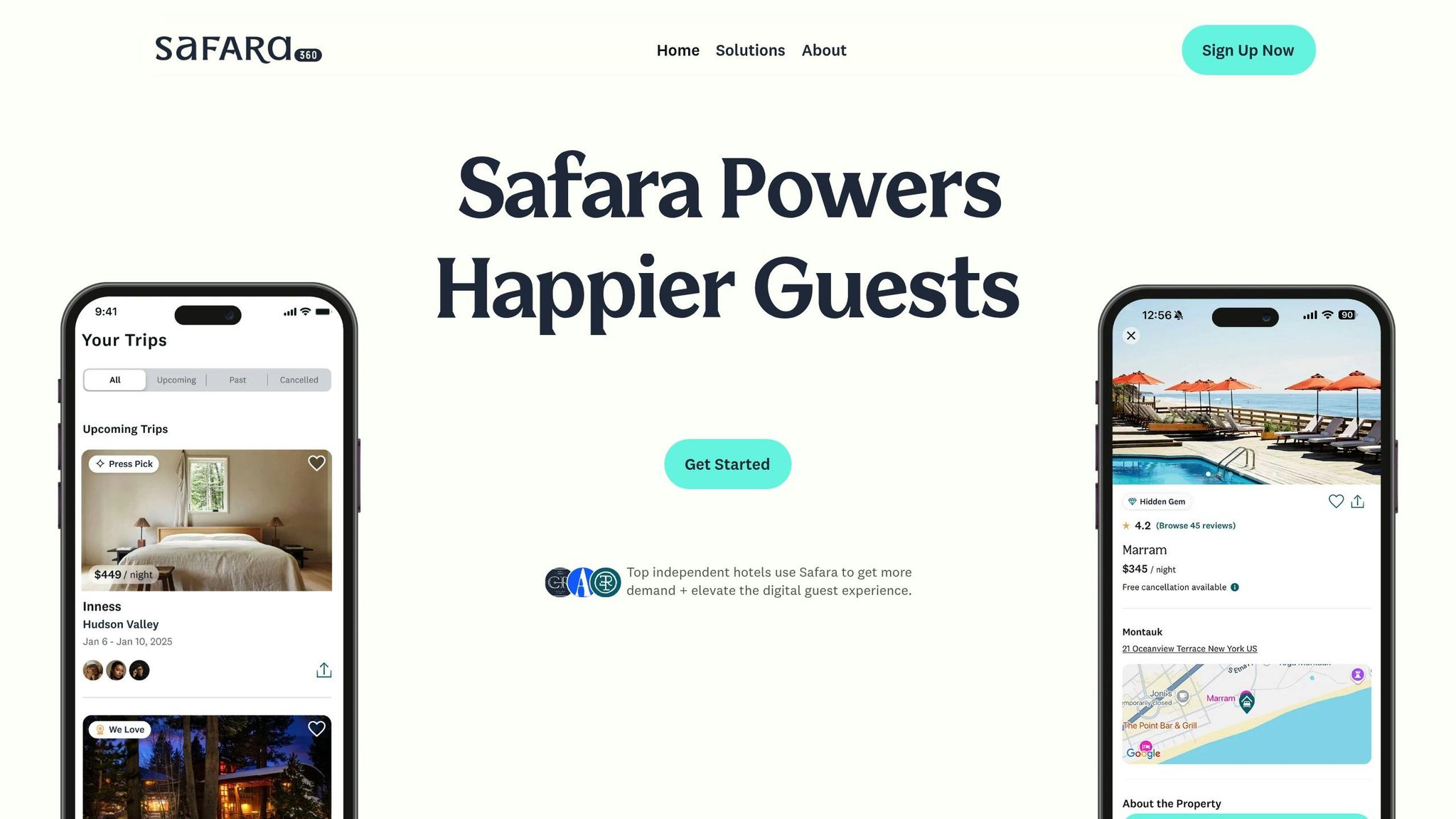
Safara focuses on increasing direct bookings by using an AI engine that analyzes guest behavior in real time. It has earned a stellar 5.0 rating and a 78/100 score on Hotel Tech Report.
The platform excels in guest intent analysis and preference-based filtering. By studying browsing patterns, search behaviors, and interactions, Safara's AI presents guests with tailored room options and rates. This approach minimizes booking drop-offs by addressing the friction that often pushes guests toward third-party booking platforms.
Hotels appreciate Safara's smooth integration with existing property management systems and CRM tools. This ensures that direct bookings are seamlessly incorporated into daily operations. Feedback from 15 surveyed hotels revealed that 100% would recommend Safara, highlighting its user-friendly interface and responsive design as key benefits.
"Safara's booking engine streamlines the reservation process, enhancing user conversion by keeping users on the same site instead of redirecting them elsewhere. This seamless experience fosters trust and reduces drop-off, making it an invaluable tool for direct bookings." - Development, X-Large Hotel
Safara also features real-time availability, ensuring guests see accurate room inventory and pricing. Its flexible integration allows hotels to maintain their branding throughout the booking process. However, some users have expressed interest in more advanced analytics and customizable branding options to further refine their strategies.
Triptease: AI-Powered Direct Booking Platform
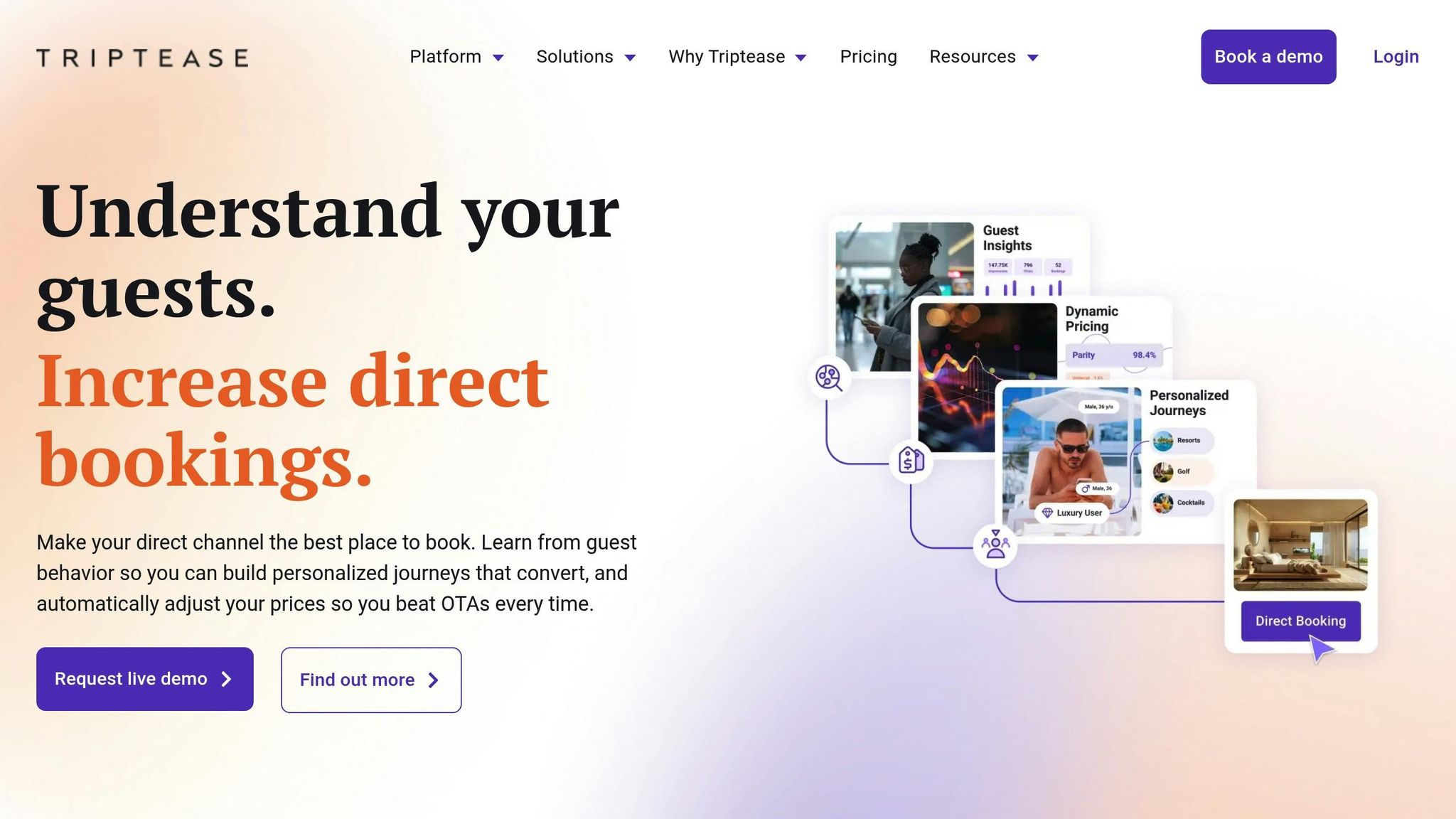
Triptease offers a wide range of tools, including AI-driven messaging and price comparison features, designed to optimize direct bookings. It integrates with over 120 booking engines and CRMs, making it compatible with a variety of hotel systems.
At its core, Triptease focuses on delivering personalized guest experiences throughout the booking journey. By analyzing visitor behavior, its AI delivers targeted messages at critical decision points, encouraging guests to finalize their reservations directly with the hotel instead of opting for online travel agencies.
A standout feature is its price parity monitoring, which ensures that guests see competitive rates on the hotel's direct channels. The platform's Price Check tool, initially designed to make direct booking more appealing, continues to be a cornerstone of its offerings.
Triptease has also expanded its capabilities through strategic partnerships. For example, it teamed up with HiJiffy to integrate AI-powered chat services, creating a more comprehensive guest engagement solution.
"HiJiffy was the obvious choice to take over our AI-powered chat service. As the Triptease platform has expanded to provide personalized experiences across the entire booking journey, we were looking for a chat specialist we could trust to provide continuous quality innovation to our clients." - Charlie Osmond, Triptease Co-founder and Chief Tease
This collaboration underscores how modern AI tools can work together, with each platform adding unique strengths to improve overall booking performance.
Whippy.ai: Voice AI for Multi-Channel Support
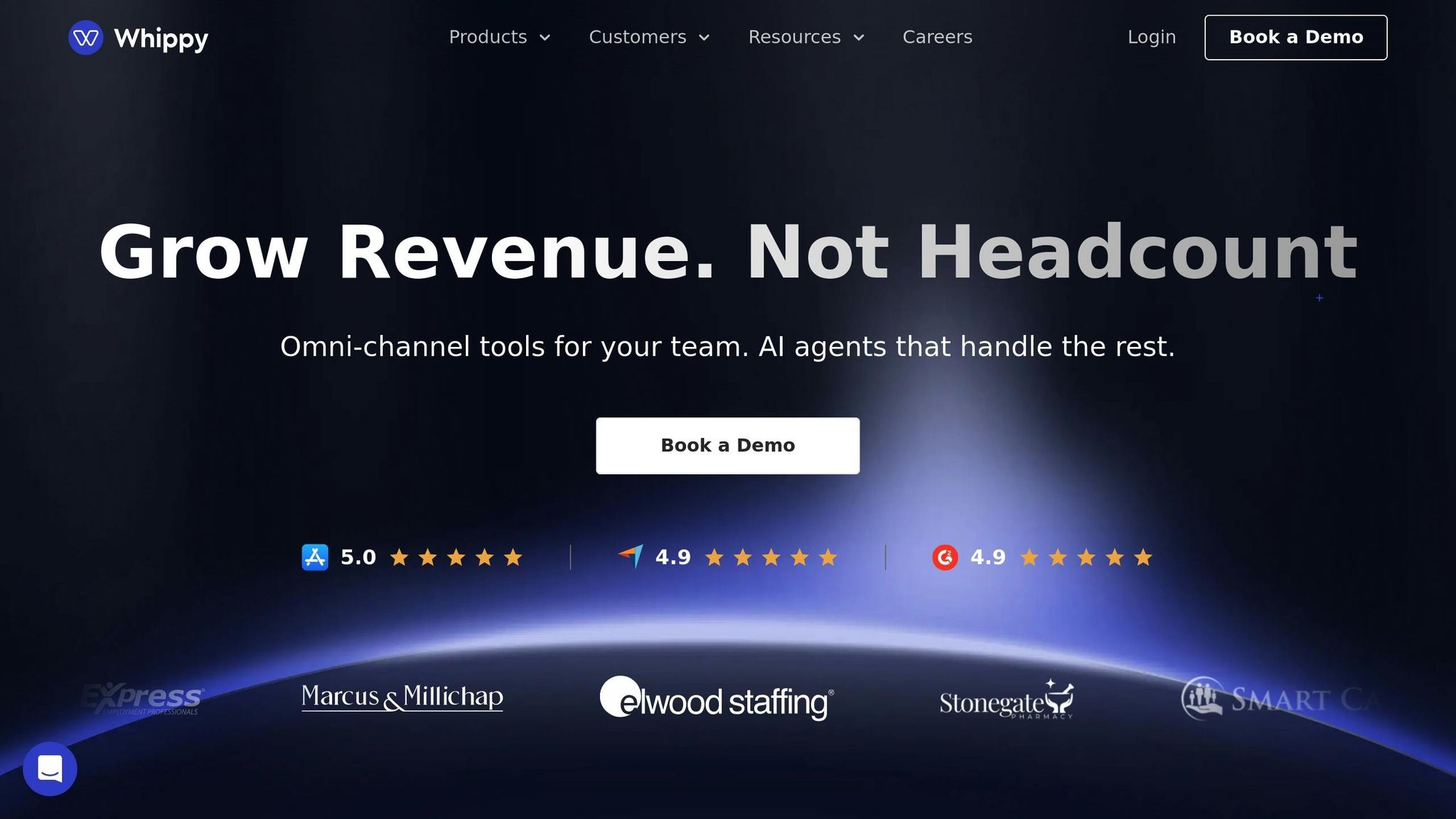
Whippy.ai is designed to handle bookings and inquiries across multiple channels, including SMS, web chat, email, and phone. This unified communication approach complements Dialzara's phone-focused features.
The platform's AI Answering Service acts as a virtual front desk, managing guest interactions based on the communication channel. For example, the Voice AI Assistant handles phone calls 24/7, checking availability and completing bookings, while the text-based AI efficiently manages SMS and web chat inquiries.
A small independent hotel provides a practical example: Whippy.ai's Voice AI manages late-night calls, checking room availability, confirming rates, and securing bookings over the phone. During the day, SMS and chat inquiries are handled seamlessly, allowing the front desk team to focus on in-person service.
By automating communication across all channels, Whippy.ai ensures no bookings are missed due to staff unavailability or closed front desks. Its ability to manage multiple channels simultaneously helps hotels maintain consistent service quality while reducing manual workload.
Together, these specialized AI tools integrate with Dialzara to create a streamlined, end-to-end booking management system for hotels.
sbb-itb-ef0082b
AI Tools Feature Comparison for Hotel Bookings
The table below provides a snapshot of how various AI tools support multi-channel booking strategies, focusing on key features and their role in enhancing hotel bookings.
Feature Comparison Table
When deciding on the best AI tool for your hotel's booking needs, it's essential to evaluate how each platform performs in critical areas. Here's a breakdown of the main features:
| Feature | Dialzara | Safara | Triptease | Whippy.ai |
|---|---|---|---|---|
| Primary Channel Focus | Phone calls | Direct website bookings | Direct bookings via website personalization | Multi-channel (SMS, chat, email, phone) |
| Languages Supported | 40+ voice options | Information limited | Multiple languages | Multiple languages |
| PMS/CRS Integration | Yes (5,000+ business applications) | Yes (real-time inventory sync) | Yes (120+ booking engines and CRMs) | Yes (including Stayflexi integration) |
| Deployment Speed | Under 10 minutes | Quick setup | Standard implementation | Fast deployment |
| 24/7 Availability | Yes | Real-time availability display | Yes | Yes (Voice AI Assistant) |
| Automation Capabilities | Call answering, transfers, appointment booking | Automates direct booking process and inventory sync | Price matching and personalized messaging | Multi-channel communication automation |
| Personalization Features | Customizable voice and engagement style | Streamlined direct booking experience | Website personalization and targeted messaging | Standard messaging |
| Cost Savings | Up to 90% compared to hiring staff | Boosts direct booking efficiency | Increases direct booking conversion | Reduces manual workload across channels |
| Notable Strengths | Transparent pricing and industry-specific expertise | Seamless integration with booking systems | Price parity monitoring and extensive integrations | Unified communication across channels |
Channel Coverage Comparison
Dialzara focuses on phone support with lifelike AI voice capabilities, offering 24/7 availability. On the other hand, Whippy.ai provides a broader range of communication options, including SMS, chat, email, and phone. Safara and Triptease prioritize direct bookings by enhancing website experiences.
Integration Capabilities
All platforms integrate with essential hotel management systems, but their approaches differ. Dialzara stands out with its vast PMS/CRM integrations, while Triptease connects with over 120 booking engines and CRMs. Safara supports real-time inventory synchronization for direct bookings, and Whippy.ai ensures seamless operations with integrations like Stayflexi.
Deployment and Setup
Dialzara offers the fastest deployment, with setup taking under 10 minutes. Safara, Triptease, and Whippy.ai also provide efficient implementation, making them ideal for hotels looking to scale their booking processes quickly.
Automation Depth
Each tool automates critical booking tasks. Dialzara handles the entire phone interaction process, including screening and booking. Safara simplifies the direct booking workflow through its online tools. Triptease uses automation to adjust prices and deliver personalized messaging, while Whippy.ai reduces manual work by automating multi-channel communication.
This comparison underscores the unique strengths of each tool. From Dialzara's reliable phone support and quick deployment to Whippy.ai's multi-channel communication capabilities, hotels can mix and match features to create a streamlined booking solution tailored to their needs.
Choosing the Right AI Tool for Your Hotel
Picking the right AI tool for your hotel isn't just about jumping on the latest trend - it's about addressing your specific challenges and meeting guest expectations. With 63% of hotels now using AI in some way for revenue management, it's clear that this technology has shifted from being experimental to becoming a necessity in today’s competitive market.
The first step? Identify where AI can make the most difference in your operations. For instance, demand unpredictability is a major hurdle for 60% of hoteliers when it comes to pricing in 2024. This makes revenue management an obvious focus. However, your choice should ultimately align with your property's most pressing needs - whether that’s managing phone inquiries, improving direct bookings, or streamlining multi-channel communication. Once you’ve pinpointed these needs, take a gradual approach to implementation.
Start small. Test AI with targeted projects before expanding. For example, a 50-room heritage hotel in Jaipur used an AI-driven revenue management tool during the busy Jaipur Literature Festival. The result? A 25% increase in room rates, a 20% year-over-year RevPAR boost, and nearly full occupancy. These kinds of results show the potential of starting with focused, manageable goals.
Before diving in, ensure your data - like rates, inventory, and content - is well-organized and accessible. Hotels that use AI for revenue decisions often see a 5–15% revenue increase within months.
Integration is another key factor. Your chosen AI tool should work seamlessly with your existing systems, including your PMS, CRM, and operational workflows. Additionally, strong customer support and an easy learning curve are non-negotiable.
While automation is powerful, maintaining a personal touch is vital in hospitality. Guests appreciate AI for its efficiency - 58% say it enhances their booking and stay experiences. However, 70% still prefer human assistance for more complex requests. Choose tools that enhance, rather than replace, personalized service.
"The days of the one-size-fits-all experience in hospitality are really antiquated." - Representative, Otonomus Hotel
Equally important is fostering a culture of innovation within your team. Provide thorough training and work with AI providers who offer tailored support to ensure smooth onboarding.
Budget and deployment timelines also matter. Some AI solutions can be implemented quickly, while others take more time. Consider the upfront investment against long-term benefits, as hotels using AI often report a 10% revenue increase and a 15% cost reduction.
Interestingly, 45% of independent hotels report no AI usage at all. This presents both a challenge and an opportunity. Starting with cost-effective, scalable tools that deliver clear results can help build confidence in AI adoption within your organization.
Finally, once the system is in place, don’t set it and forget it. Continuously monitor performance and adjust as needed. The AI landscape evolves quickly, and staying on top of updates is essential to align with your goals and keep pace with industry trends.
FAQs
How do AI tools enhance guest experience and streamline hotel booking operations?
AI tools have become a game-changer for hotel bookings, enhancing guest satisfaction while streamlining operations. By automating tasks such as responding to guest inquiries, handling reservations, and offering round-the-clock support, these tools deliver faster and more dependable service. The result? A smoother, more enjoyable experience for guests.
Beyond just speed, AI also minimizes human errors, refines booking processes, and allows hotel staff to dedicate more time to personalized guest interactions. This shift not only makes day-to-day operations more efficient but also boosts productivity, creating a win-win situation for both guests and staff.
What should hotels look for in an AI tool to manage bookings across multiple channels?
When choosing an AI tool for managing bookings across multiple channels, hotels should focus on how well the tool works with their current property management systems and booking platforms. A smooth connection between systems is crucial to avoid disruptions. It’s also important to pick a tool that can grow with the hotel’s needs and includes customization options to create a more tailored guest experience.
The best solutions can handle repetitive tasks like answering inquiries and managing reservations automatically. They should also support interactions across various channels, such as voice and chat, making it easier to connect with guests wherever they are. These features not only save time but also boost efficiency and help hotels get the most out of their investment. To stay ahead in the industry, hotels should also look for tools that are easy to set up and come with reliable customer support.
How does AI help hotels optimize pricing and boost revenue?
AI has become a game-changer for hotels looking to fine-tune their pricing strategies and boost revenue. By leveraging real-time demand forecasting and dynamic pricing techniques, these systems sift through massive amounts of data - like booking trends, market behavior, and competitor pricing - to adjust rates on the fly and maximize profits.
Hotels that have embraced AI tools are seeing impressive results, with revenue increases ranging from 20% to 30% and a 10% to 15% rise in revenue per available room. By automating pricing decisions and responding swiftly to market shifts, AI not only helps hotels stay ahead of the competition but also improves efficiency and strengthens their bottom line.
Summarize with AI
Related Posts
Best AI Travel Assistants for Hospitality Businesses
Explore how AI travel assistants are revolutionizing the hospitality industry by enhancing customer service and streamlining operations.
Best AI Concierge Features for Guest Personalization
Explore how AI concierge technology enhances guest personalization, boosts operational efficiency, and drives revenue in the hospitality industry.
AI Tools for Syncing Booking Systems
Streamline your booking management with AI tools that enhance call handling, schedule syncing, and 24/7 availability.
How NLP Improves Hotel Reservation Chatbots
Explore how NLP technology enhances hotel reservation chatbots, improving guest interactions and streamlining operations for better service.
